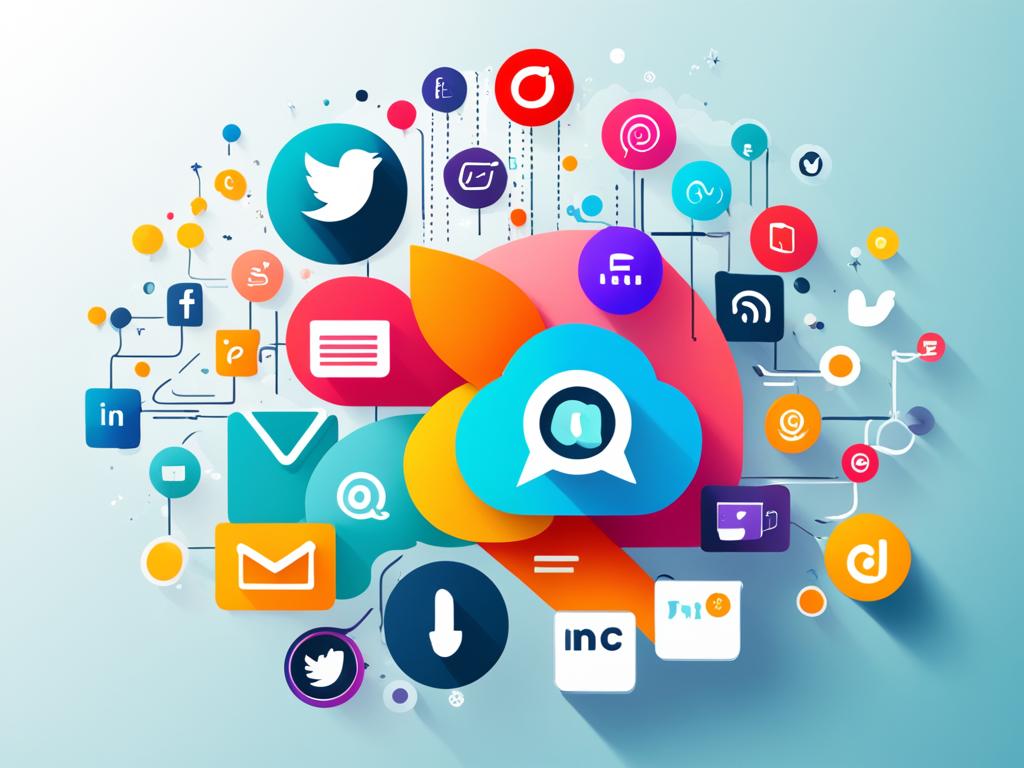Welcome to the digital age, where traditional marketing strategies are no longer enough to keep your business ahead of the competition. In today’s fast-paced world, businesses need to adapt and embrace the power of digital advertising to unlock their true potential. But what exactly makes digital advertising so essential? How can it help businesses reach a wider audience and achieve remarkable growth and success? Get ready to discover the answers as we delve into the world of online marketing, internet advertising, and the strategies that can transform your business.
Key Takeaways:
- Digital advertising is crucial in today’s digital age to stay competitive.
- It allows businesses to reach a wider audience and unlock their true potential.
- Discover the power of online marketing, internet advertising, and digital marketing strategies.
- Learn how digital advertising can help achieve remarkable growth and success.
- Stay ahead of the competition by embracing the world of digital advertising.
The Benefits of Digital Marketing
Digital marketing offers numerous benefits that can transform businesses in today’s digital landscape. Let’s explore the key advantages:
1. Brand Visibility
Digital marketing enhances brand visibility by reaching a wider audience. Through targeted strategies, businesses can improve website visibility on search engine result pages.
2. Targeted Marketing
With digital marketing, businesses can tailor their messages to specific demographics, increasing the chances of conversion and customer retention. This level of personalization significantly improves marketing effectiveness.
3. Cost-Effectiveness
Digital marketing channels often offer a cost-effective alternative to traditional marketing channels. Businesses can optimize their budgets by focusing on targeted campaigns that generate measurable results.
4. Measurable Results
Analytics tools provide businesses with comprehensive data, allowing them to track and measure the success of their digital marketing campaigns. This data-driven approach empowers businesses to make informed marketing decisions and refine their strategies for better outcomes.
5. Customer Engagement
Digital marketing facilitates direct and instant communication with customers, fostering trust and loyalty. By engaging with customers through various channels, businesses can build meaningful relationships and gain valuable feedback.
6. Global Reach
Digital marketing breaks geographical barriers and enables businesses to expand their reach beyond local markets. With a global audience within reach, businesses can tap into new markets and unlock growth opportunities.
By leveraging the benefits of digital marketing, businesses can gain a competitive edge, drive growth, and achieve remarkable success.
Types of Digital Marketing
Digital marketing offers businesses a wide range of strategies to effectively reach their target audience. Let’s explore some of the key types of digital marketing:
1. Search Engine Optimization (SEO)
SEO involves optimizing websites to improve their visibility on search engine result pages. By implementing SEO techniques, businesses can rank higher in organic search results, attract more organic traffic, and increase their online presence.
2. Content Marketing
Content marketing focuses on creating and sharing valuable and relevant content to attract and engage an audience. By providing valuable information or entertaining content, businesses can establish themselves as industry leaders and build strong relationships with their target audience.
3. Social Media Marketing
Social media marketing leverages platforms like Facebook, Instagram, Twitter, and LinkedIn to connect with the target audience. Businesses can engage with their audience, build brand awareness, and drive website traffic through engaging content, strategic advertising, and community management.
4. Email Marketing
Email marketing involves using emails to communicate with customers, nurture leads, and drive conversions. Businesses can send personalized messages, targeted offers, and informative newsletters to their subscribers, fostering long-term relationships and encouraging repeat business.
5. Pay-Per-Click (PPC) Advertising
PPC advertising allows businesses to display ads on search engines or websites and pay only when a user clicks on the ad. This method provides instant visibility, targeted advertising, and measurable results, making it an effective way to drive traffic and generate leads.
6. Affiliate Marketing
Affiliate marketing involves partnering with other businesses or individuals (affiliates) to promote products or services. Affiliates earn a commission for every sale or lead they generate through their marketing efforts, making it a cost-effective and performance-based strategy for businesses.
7. Influencer Marketing
Influencer marketing utilizes influential individuals who have a large following and credibility in their niche to promote products or services. By partnering with influencers, businesses can leverage their authenticity and reach a wider audience, building brand awareness and driving conversions.
By incorporating these various digital marketing strategies into their overall marketing approach, businesses can effectively reach and engage their target audience, drive brand awareness, and achieve their marketing goals.

The Rise of Digital Marketing
Digital marketing has become increasingly important in today’s business landscape. With shifting consumer behavior and the widespread adoption of digital technologies, businesses have recognized the value and effectiveness of digital marketing strategies. In this section, we will explore the rise of digital marketing and its significance in reaching a broader audience, achieving measurable results, and providing a cost-effective solution for businesses.
Shifting Consumer Behavior
In the digital age, consumers spend a significant amount of time online, from browsing social media platforms to conducting product research. These online activities have influenced consumer behavior, including how they consume information, make purchasing decisions, and interact with brands. Businesses need to adapt to this changing landscape and meet their target audience where they are – online.
Measurable Results
One of the key advantages of digital marketing is its ability to provide measurable results. Unlike traditional marketing methods, digital marketing allows businesses to track and analyze their campaigns in real-time. With the help of analytics tools, businesses can monitor website traffic, engagement metrics, conversion rates, and other key performance indicators. This data-driven approach enables businesses to make informed decisions, optimize their marketing strategies, and achieve better outcomes.
Cost-Effectiveness
Digital marketing offers a cost-effective solution for businesses of all sizes. Compared to traditional marketing channels, such as print or television ads, digital marketing allows businesses to reach a broader audience at a lower cost. With targeted advertising options, businesses can tailor their marketing messages to specific demographics, ensuring that their budget is allocated efficiently.
Broader Reach
Thanks to the internet, businesses can extend their reach beyond their local markets and tap into a global audience. Digital marketing breaks down geographical barriers, allowing businesses to connect with potential customers worldwide. Whether through search engine optimization (SEO), social media marketing, or other digital channels, businesses can expand their brand’s visibility and attract a diverse customer base.
„Digital marketing provides businesses with the opportunity to reach a broader audience, achieve measurable results, and do so at a fraction of the cost compared to traditional marketing methods.“ – Marketing Expert
As the importance of digital marketing continues to grow, it is essential for businesses to embrace this shift and incorporate digital strategies into their overall marketing plans. The rise of digital marketing offers businesses an unprecedented opportunity to engage with their target audience, generate leads, and drive sustainable growth. In the next section, we will explore the future of digital marketing and the exciting developments that lie ahead.
The Future of Digital Marketing
If we thought digital marketing had already revolutionized the way businesses connect with their target audience, we haven’t seen anything yet. The future of digital marketing holds even more exciting developments that will reshape the industry and transform the way brands communicate, engage, and convert customers. Let’s take a glimpse into the future and explore the key trends that will shape the next chapter of digital marketing:
1. AI and Automation
The rise of AI and automation will revolutionize digital marketing by enabling businesses to analyze vast amounts of data and automate routine tasks. Marketers can harness the power of AI to gain valuable insights, improve personalization, and enhance the customer experience. With automation, repetitive tasks like email campaigns and social media scheduling can be streamlined, freeing up valuable time for strategic initiatives.
2. Voice Search Optimization
Voice-activated devices and virtual assistants have skyrocketed in popularity, making voice search optimization a critical component of digital marketing strategies. Businesses will need to optimize their content to match voice search queries, ensuring their websites rank highly and deliver relevant information. Voice search optimization will reshape the way businesses create and structure content, emphasizing conversational language and long-tail keywords.
3. Video Dominance
Video content will continue to dominate the digital landscape, captivating audiences and driving engagement. Platforms like TikTok and YouTube Shorts will thrive, providing opportunities for brands to showcase their products and services creatively. Video marketing will become a staple for digital campaigns, enabling businesses to deliver powerful and immersive storytelling experiences.
4. Personalization and User Privacy
As consumers become increasingly aware of their privacy rights, businesses will need to balance personalization with stringent user privacy measures. Brands must navigate the fine line between delivering tailored experiences and respecting user data privacy. Ethical marketing practices and transparency will be key as businesses strive to build trust and forge long-lasting connections with their audience.
5. Augmented Reality (AR) and Virtual Reality (VR)
AR and VR technologies will revolutionize digital marketing by creating immersive experiences for customers. Brands can leverage these technologies to offer product demonstrations, virtual try-ons, and interactive storytelling. From virtual showrooms to augmented reality fitting rooms, AR and VR will transform the way customers engage with brands, creating memorable and impactful interactions.
6. Ephemeral Content
Ephemeral content, such as stories on Instagram and Snapchat, will continue to play a significant role in digital marketing strategies. With limited-time availability and a sense of urgency, ephemeral content creates a fear of missing out (FOMO) effect, driving increased engagement and user participation. Brands can leverage this trend to share behind-the-scenes content, product teasers, and exclusive offers to connect with their audience on a more personal level.
7. Sustainability and Ethical Marketing
As environmental concerns and ethical considerations gain prominence, sustainability and ethical marketing will become integral to digital strategies. Consumers increasingly align themselves with brands that demonstrate eco-friendly practices and social responsibility. Businesses that embrace sustainability and ethical marketing will resonate with socially conscious consumers, forging strong connections and loyalty.
8. Data-driven Insights
Data will continue to be the driving force behind effective digital marketing strategies. Businesses will rely on data-driven insights to make informed decisions, optimize campaigns, and deliver personalized experiences. From customer behavior analysis to predictive analytics, data-driven insights will shape every aspect of digital marketing, empowering businesses to stay competitive in an ever-evolving landscape.

| Trends | Impact |
|---|---|
| AI and Automation | Streamlined processes, improved personalization, and enhanced customer experience. |
| Voice Search Optimization | Optimized content for voice search queries, better website visibility, and relevance. |
| Video Dominance | Engaging storytelling, increased user engagement, and improved brand awareness. |
| Personalization and User Privacy | Tailored experiences while respecting user privacy and building trust. |
| Augmented Reality (AR) and Virtual Reality (VR) | Immersive experiences, interactive storytelling, and memorable brand interactions. |
| Ephemeral Content | FOMO effect, increased user engagement, and personalized brand connection. |
| Sustainability and Ethical Marketing | Resonating with conscious consumers, building loyalty, and strong brand connections. |
| Data-driven Insights | Informed decision-making, optimization, and personalized experiences. |
Understanding the Basics of Digital Marketing
Digital marketing encompasses a range of strategies and techniques used to promote products and services through online channels. It is a dynamic and ever-evolving field that leverages search engines, social media platforms, email marketing, and websites to reach and engage the target audience.
At its core, digital marketing aims to increase brand awareness, drive website traffic, generate leads, and ultimately, boost conversions and sales. By leveraging the power of online channels, businesses can connect with their target audience, establish a strong online presence, and achieve their marketing goals.
To paint a clearer picture, let’s take a closer look at some key components of digital marketing:
Brand Awareness
Brand awareness is a fundamental aspect of digital marketing. It involves creating and promoting a strong brand identity that resonates with the target audience. Through consistent branding efforts, businesses can enhance their visibility and recognition in the digital landscape.
Website Traffic
Driving high-quality traffic to a website is crucial for digital marketing success. By optimizing their online presence, businesses can attract relevant visitors who are more likely to engage with their offerings and convert into customers.
Lead Generation
Generating leads is a key objective for businesses in the digital realm. Through strategic tactics such as lead magnets, interactive content, and compelling call-to-actions, businesses can capture valuable information from potential customers and nurture those leads into conversions.
Conversions and Sales
Ultimately, the goal of digital marketing is to drive conversions and sales. By implementing effective conversion rate optimization (CRO) strategies, businesses can optimize their digital assets and customer journey to maximize the number of successful transactions.
Understanding the basics of digital marketing is essential for any business looking to thrive in the digital age. By leveraging online channels and implementing targeted marketing strategies, businesses can enhance their brand awareness, increase website traffic, generate valuable leads, and ultimately boost conversions and sales.
The Importance of Digital Marketing in Today’s Business Landscape
In today’s digital age, connected consumers spend a significant amount of time online, making digital marketing indispensable for businesses. With the ability to target specific audiences and deliver measurable results, digital marketing has revolutionized the way companies communicate and engage with their customers. The online behavior of consumers provides valuable insights that can be leveraged to create effective marketing strategies and drive business growth.
One of the key advantages of digital marketing is its global reach. Unlike traditional marketing methods, which are often limited to a specific geographic area, digital marketing allows businesses to transcend boundaries and connect with a worldwide audience. This global reach opens up new opportunities for expansion and taps into previously untapped markets.
Not only does digital marketing offer a broader reach, but it also provides cost-effectiveness. Compared to traditional advertising channels such as television or print media, digital marketing offers a more affordable way to promote products and services. By targeting specific demographics and optimizing campaigns based on measurable data, businesses can achieve meaningful results without breaking the bank.
Measuring the success of marketing efforts is crucial for any business, and digital marketing provides the tools to do just that. Through analytics platforms, businesses can track the performance of their campaigns in real-time. They can measure website traffic, engagement rates, conversion rates, and other key metrics to gauge the effectiveness of their marketing strategies. These measurable results enable businesses to make data-driven decisions and refine their digital marketing efforts for optimal performance.
„Digital marketing allows businesses to reach a global audience, transcend geographical barriers, and achieve measurable results.“
The Power of Data
Data is at the heart of successful digital marketing campaigns. By analyzing the online behavior of consumers, businesses can gain valuable insights into their preferences, interests, and purchasing habits. This enables businesses to tailor their marketing messages and deliver personalized experiences that resonate with their target audience.
Moreover, digital marketing allows for continuous optimization and improvement. With the ability to test and iterate marketing campaigns in real-time, businesses can quickly identify what works and what doesn’t. This agility and flexibility empower businesses to adapt their strategies based on the insights gained from data analysis.
| Benefits of Digital Marketing | Explanation |
|---|---|
| Connected Consumers | Target specific audiences based on online behavior and preferences. |
| Online Behavior | Analyze consumer data to gain insights and tailor marketing strategies. |
| Measurable Results | Track and measure the performance of marketing campaigns in real-time. |
| Global Reach | Expand the business’s reach to a worldwide audience through digital channels. |
| Cost-effectiveness | Allocate marketing budget efficiently and optimize campaigns for maximum ROI. |
With its ability to connect with connected consumers, analyze online behavior, provide measurable results, offer global reach, and deliver cost-effectiveness, digital marketing has become a fundamental component of today’s business landscape. It empowers businesses to engage with their target audience effectively, drive brand awareness, and achieve remarkable growth in a rapidly evolving digital world.
Components of Digital Marketing
In the realm of digital marketing, several components work in tandem to create a powerful and comprehensive strategy. These components play crucial roles in improving brand visibility, engaging with the target audience, and nurturing customer relationships. Let’s explore the key components that make up digital marketing:
1. Search Engine Optimization (SEO)
Search Engine Optimization, or SEO, is the practice of optimizing your website in order to improve its visibility and organic ranking on search engine results pages (SERPs). By employing various techniques such as keyword research, on-page optimization, and link building, SEO aims to drive organic traffic and increase relevant website visits.
2. Social Media Marketing
Social media marketing leverages popular social platforms like Facebook, Instagram, Twitter, and LinkedIn to connect with the target audience. By creating engaging and shareable content, interacting with users, and running targeted ad campaigns, businesses can effectively build brand awareness, drive website traffic, and foster customer engagement.
3. Content Marketing
Content marketing involves creating and distributing valuable, relevant, and consistent content to attract and retain a clearly defined audience. This component aims to provide value to users, establish thought leadership, and build trust with customers. Content marketing can take various forms such as blog posts, ebooks, videos, infographics, and podcasts.
4. Email Marketing
Email marketing is a direct and personalized communication channel that helps businesses nurture leads and build strong customer relationships. By sending targeted emails to segmented audiences, businesses can provide valuable information, promote products or services, and drive conversions. Email marketing is a cost-effective way to engage with customers, deliver personalized messages, and generate repeat business.
These four components form the foundation of a successful digital marketing strategy. By utilizing each component effectively, businesses can create a cohesive and comprehensive approach to reaching their target audience and achieving their marketing goals.
| Components | Description |
|---|---|
| Search Engine Optimization (SEO) | Optimizes websites to improve organic visibility on search engine results pages. |
| Social Media Marketing | Utilizes social platforms to engage with the target audience and drive website traffic. |
| Content Marketing | Creates valuable and relevant content to attract and retain a defined audience. |
| Email Marketing | Sends targeted emails to nurture leads, build relationships, and drive conversions. |
Building a Successful Digital Marketing Strategy
To achieve success in the ever-evolving digital landscape, it is crucial to have a well-defined and effective digital marketing strategy. This section will guide you through the key steps in building a successful strategy that aligns with your business goals, target audience, and the right digital marketing channels.
Setting Clear Marketing Goals
Before diving into the world of digital marketing, it’s important to establish clear and measurable goals. These goals will serve as your roadmap, guiding all your marketing efforts. Whether your goal is to increase brand awareness, drive website traffic, generate leads, or boost sales, having a clear direction will help you stay focused and make informed decisions.
Understanding Your Target Audience
Understanding your target audience is a fundamental aspect of any successful marketing strategy. By knowing who your customers are, their preferences, needs, and pain points, you can craft tailored messages and deliver them through the most effective channels. Conducting market research, analyzing demographics, and utilizing customer insights will provide valuable information to segment your audience and personalize your marketing efforts.
Choosing the Right Digital Marketing Channels
With a plethora of digital marketing channels available, it’s crucial to choose the ones that align with your target audience and business goals. Some popular digital marketing channels include search engine optimization (SEO), social media marketing, content marketing, email marketing, and more. Each channel has its own strengths and advantages, and selecting the right mix will ensure your messages reach the intended audience in the most impactful way.
Experimentation and Analysis
A successful digital marketing strategy requires continuous experimentation and analysis. Monitor the performance of your campaigns, test different approaches, and analyze the results to gain insights into what works best for your business. By consistently refining and optimizing your strategy based on data-driven insights, you can maximize the effectiveness of your digital marketing efforts.
Experimentation is the key to finding your optimal digital marketing strategy. Try new approaches, analyze the results, and adapt accordingly.
Building a Successful Digital Marketing Strategy – Table
| Key Steps | Description |
|---|---|
| Set Clear Marketing Goals | Establish measurable objectives that align with your business goals. |
| Understand Your Target Audience | Conduct market research, analyze demographics, and gain customer insights to segment and personalize your marketing efforts. |
| Choose the Right Digital Marketing Channels | Select the channels that best reach your target audience and align with your goals, such as SEO, social media, content marketing, and email marketing. |
| Experimentation and Analysis | Continuously test and analyze your campaigns, refining your strategy based on data-driven insights. |
By following these key steps, you can build a successful digital marketing strategy that helps you effectively reach your target audience, achieve your marketing goals, and drive business growth. Remember, digital marketing is an ever-evolving field, so continuous learning, adaptation, and staying up-to-date with the latest trends and technologies are essential for long-term success.
Conclusion
Digital advertising is a powerful tool in today’s digital age, offering businesses numerous benefits to help them thrive. It provides enhanced brand visibility, allowing businesses to reach a wider audience and increase their online presence. Through targeted marketing, businesses can tailor their messages to specific demographics, maximizing their chances of converting leads into customers.
One of the key advantages of digital advertising is its cost-effectiveness. Compared to traditional marketing methods, digital advertising offers measurable results, allowing businesses to track and analyze their campaigns in real-time. This data-driven approach enables businesses to optimize their strategies and make informed decisions to achieve the best results.
Moreover, digital advertising fosters customer engagement by providing direct and instant communication channels. Social media ads, search engine marketing, PPC advertising, display advertising, and other digital marketing strategies enable businesses to connect and interact with their target audience effectively. Furthermore, digital advertising breaks geographical barriers, providing businesses with a global reach and the opportunity to tap into new markets.
In conclusion, embracing digital marketing strategies is essential for businesses seeking remarkable growth and success. By adopting digital advertising, businesses can unlock their true potential, connect with their target audience effectively, and stay ahead of the competition in the ever-evolving digital landscape.
FAQ
What is digital advertising?
Digital advertising refers to the use of online channels, such as websites, social media platforms, search engines, and mobile apps, to promote products or services. It includes various strategies like social media ads, search engine marketing, display advertising, and PPC advertising.
What are the benefits of digital marketing?
Digital marketing offers several benefits, including enhanced brand visibility, targeted marketing to specific demographics, cost-effectiveness compared to traditional methods, measurable results through analytics tools, direct and instant customer communication, and the ability to reach a global audience.
What are the different types of digital marketing?
There are several types of digital marketing strategies, including search engine optimization (SEO) for improving website visibility, content marketing for creating and sharing valuable content, social media marketing for connecting with the target audience on platforms like Facebook and Instagram, email marketing for customer communication, pay-per-click (PPC) advertising for paid ads, and affiliate marketing and influencer marketing for partnerships with other businesses or individuals.
Why has digital marketing gained prominence?
Digital marketing has gained prominence due to factors such as shifting consumer behavior, with people spending more time online, the ability to track and analyze campaigns in real-time, cost-effectiveness compared to traditional marketing methods, and the ability to reach a global audience through the internet.
What does the future of digital marketing hold?
The future of digital marketing will see advancements in AI and automation, optimization for voice search, the dominance of video content, increased personalization, the integration of augmented reality (AR) and virtual reality (VR), the popularity of ephemeral content like stories, a focus on sustainability and ethical marketing, and decision-making guided by data-driven insights.
What is the definition of digital marketing?
Digital marketing refers to the use of online channels, such as search engines, social media, email, and websites, to promote products or services, increase brand awareness, drive website traffic, generate leads, and boost conversions and sales.
Why is digital marketing important for businesses?
Digital marketing is important for businesses because it allows them to reach connected consumers who spend a significant amount of time online, provides measurable results and analytics tools to track campaigns, offers global reach and the ability to transcend geographical boundaries, and is cost-effective compared to traditional marketing methods.
What are the components of digital marketing?
The components of digital marketing include search engine optimization (SEO) for improving website visibility, social media marketing for engaging with the audience on platforms like Facebook and Twitter, content marketing for creating valuable content, and email marketing for customer communication and lead nurturing.
How can businesses build a successful digital marketing strategy?
Building a successful digital marketing strategy involves setting clear and measurable goals, understanding the target audience, choosing the right digital marketing channels, conducting market research and data analysis, and constantly experimenting, analyzing, and fine-tuning the strategy.
Why is digital advertising crucial for businesses?
Digital advertising is crucial for businesses because it offers benefits such as enhanced brand visibility, targeted marketing to specific demographics, cost-effectiveness, measurable results through analytics tools, direct and instant customer communication, and the ability to reach a global audience.

The Ulitmate Email Arsenal
„Banish Email Writer’s Block: Fuel Your Success With A Year’s Supply Of Email Subject Ideas & Conversion Driven Templates!“
- Over 52 Genius Email Subject Ideas & Content, one for every week of the year, paired seamlessly with over 52 high-converting email templates…
- Never be Stuck for Ideas Again: 40+ page guide, packed with over 8000 words of actionable insights, strategies, and insider tips to save you time…
- Get Ahead of Your Competitors: Unleash consistent engagement and keep your audience hooked, week after week…


